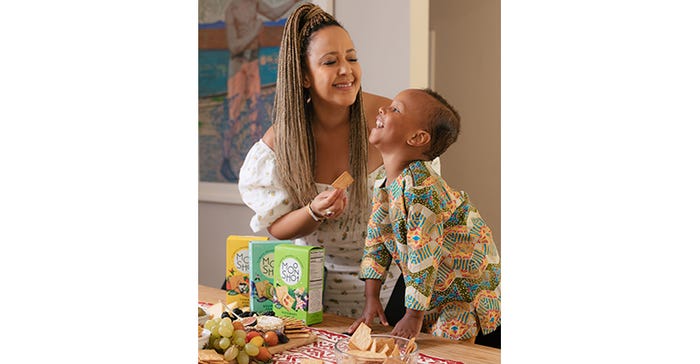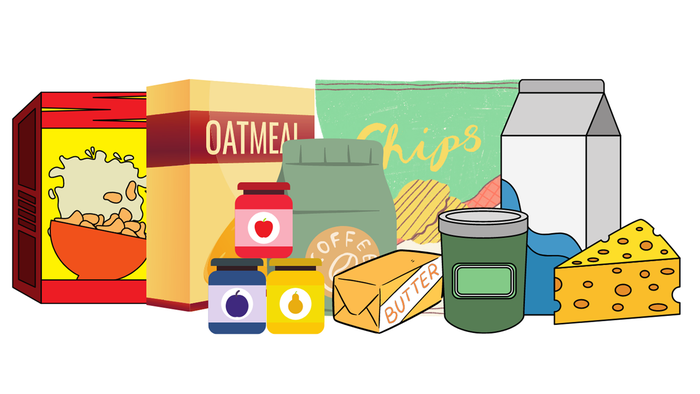
Sustainability is at the heart of Moonshot Snacks' mission, beginning with its ingredients. The two primary ingredients in the brand's crackers—organic artisan wheat and sunflower oil—are both traceable back to farmer and field, and the wheat is grown only two miles from the mill where it becomes flour.
Shorter supply chains mean less time on the road, bolder flavor—and a smaller carbon footprint. Moonshot's founder and CEO Julia Collins is proud her brand has been carbon neutral since day one.
Perhaps the most impactful initiative, though, is Moonshot's commitment to regenerative agriculture. The brand is committed to supporting new topsoil creation and works with farmers who have built soil health right into their cultivation methods. From cover cropping to reducing tillage, Moonshot is leading the way in promoting a regenerative supply chain. For its climate mission and taste, Moonshot won the Expo West Virtual 2021 NEXTY Award for Best New Savory or Salty Snack.
Moonshot also invites its consumers to participate in its sustainability mission, with a new commitment to find a home-compostable packaging solution.

'Sustainability' means different things to different brands. How do you define it?
Julia Collins: Moonshot is a climate-friendly snack brand; that means we keep the planet in mind with every decision we make, from seed in soil to the end consumer. We've tracked the impact our product and company have at every step of the process and made reductions to emissions where possible. Anything we can't reduce, we've offset to reach carbon neutrality—and in fact, we offset more than necessary to ensure we're truly making a positive impact on the planet.
To minimize the offsets needed, we use regeneratively grown wheat to make our crackers and about 75% of our supply chain is within Washington state. What's more, we produce our crackers in a LEED-certified facility that runs on renewable energy. Plus, our boxes are made with 100% recycled materials and are recyclable.
To us, it's not one action, but taking a full inventory of your company's impact on the planet so you can holistically evaluate where you can make adjustments and drive change. It all starts with measuring your baseline carbon footprint so you can create an action plan from there and track progress year over year.
 What have been some of your most notable sustainability successes?
What have been some of your most notable sustainability successes?
JC: Regenerative agriculture is core to achieving our sustainability goals. Regenerative agriculture is a set of farming practices, such as cover cropping, low or no-tillage and livestock integration that improve soil health and allow for more carbon to be sequestered and stored in the ground.
We're so proud to work with regenerative family farmers to source our wheat for our crackers, like farmers Dave and Serena Hedlin up in Washington's Skagit Valley. They grow delicious wheat alongside many diverse crops in a regenerative system. Moonshot's wheat has about 50% lower emissions than conventional wheat, giving us a great head start on our carbon neutrality goals.
Has it been difficult to source ingredients grown via regenerative agriculture?
JC: I started with sourcing when I set out to create this snack brand. Finding the right regenerative farm partners was our core focus, before deciding what kind of snack to make. After we met Dave and Serena and tasted the flour from their nutrient-dense, regenerative wheat, it became clear that we needed to make crackers. As we've grown over the past year, we actually began working with an additional regenerative farm near Walla Walla, Washington.
We look to expand our product line beyond crackers in the coming months, and we'll follow a similar path, allowing ingredients and farmers to drive our innovation plans. This helps us ensure we're partnering with folks who are as passionate about regenerating soil as we are.
Was your packaging always eco-friendly, or was that something you achieved over time?
JC: Since we launched in December 2020, we've used a cardboard box made from 100% recycled materials that are recyclable and a thin plastic inner bag. While this is a great start, we feel there's room for improvement in our packaging. With current options on the market, our packaging setup is the best option to ensure our crackers arrive at your door fresh and in one piece.
We're actively looking at other options—such as Post-Consumer Recycled (PCR) plastics that help drive the circular economy—to further reduce the impact our product has on the planet.
How can your retail partners help promote sustainable brands and educate their consumers on the importance of shopping "green?"
JC: We envision a future where regenerative agriculture is celebrated and promoted at every retailer, and consumers can easily assess how climate-friendly a product is through carbon labels on packaging.
A great place to start would be climate-friendly endcaps and aisles, where all products on the shelf meet a set of sustainability standards, such as carbon neutral operations or the use of regeneratively grown ingredients. We'd also love to see easy-to-find education on the impact these products make on the planet to help consumers understand the impact of their choices.
Moonshot may have been at the start of the climate-friendly food movement, but we're far from the only ones growing it. We're so proud of how rapidly this movement has expanded, as more and more brands prioritize the planet's health alongside human health. We look forward to the day in the near future when the climate-friendly food aisle becomes a reality!
About the Author
You May Also Like
.png?width=700&auto=webp&quality=80&disable=upscale)


